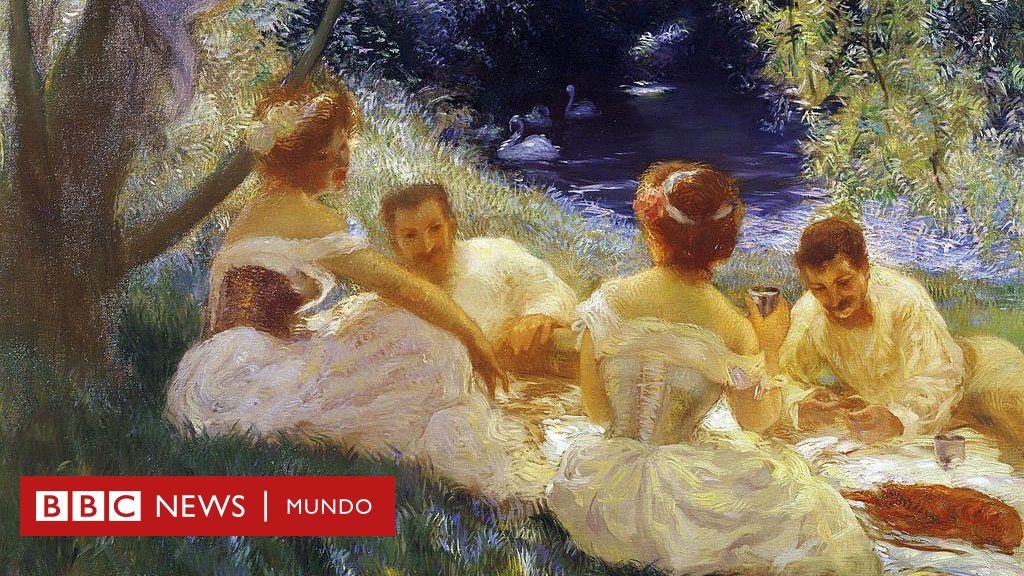- Drafting
- BBC News World
—
Image source, Getty Images
—
–
“Life is a picnic on a cliff,” according to writer WH Auden, while for his friend the author W. Somerset Maugham, there were “few things as pleasant as a picnic.”
–
Put in that order, the conclusion is as encouraging as the idea of packing delicacies in a basket and meeting with loved ones in some country place to enjoy a joyful moment “al fresco”.
–
Eating outdoors is something that, of course, we have been doing since the dawn of mankind, and events similar to our picnics appear in the writings of the Greek philosopher Plutarch and the Roman Seneca, as well as the Roman poet Ovid.
–
However, according to experts, the idea of that occasion as we know it today began to take shape in medieval times, with banquets served after hunting expeditions.
–
It was, as it was for several centuries, an aristocratic pastime because it not only required being able to afford to spend hours in recreation and not work, but also as servants, since what was offered was not just any sandwich.
–
Large trays of food were served on heavy tables alongside chandeliers, silverware, and crystal goblets.
–
Image source, Getty Images
—
“Picnic in the country, in the garden of an inn on the outskirts of Strasbourg”, ca 1750, by Theophile Schuler (1821-1878).
–
In addition to being so formal, the motive for these protopícnics was hunting and not, as it was later, a meal outside as an escape to nature.
–
And if you had told those hunters that a picnic awaited them at the end of the day, they would not have understood you, because the word did not exist in the Middle Ages.
–
Chop a little
If we embrace the idea that nothing exists until it is named, we have a problem, well the history of origin of the word is a mystery.
–
Much seems to indicate that it comes from French and that it dates back to the seventeenth century when the term ‘picnic‘ (sting -chop or collect- and nique -a small amount or not at all-).
–
A 1692 edition of Origins of the Francoise language of Menage mention the picnic, indicating that the term had been used for some time in France.
–
Image source, Heritage Images
—
When “Lunch on the Grass” by the Master of Brunswick was painted, circa 1535-1540, the word did not yet exist.
–
It is possible that it was derived from the name of the protagonist of a seventeenth-century French satire, “The charmans effects of the barricades, or the lasting friendship of the company of the Bachic brothers of Picnic“(1649), a glutton who does not stop eating despite the fact that his companions suffer from a shortage of food.
–
In any case, a picnic it described a social event, usually held indoors, where guests brought something for food, whether it was a full plate, a drink, or a monetary contribution.
–
By the 18th century they were a favorite pastime of the aristocracy, which sometimes even included dances.
–
The revolution
With the outbreak of the French Revolution, the aristocrats who were saved from the guillotine found refuge in European countries and the United States.
–
Many ended up in London, where, despite not enjoying the splendid means as before, they insisted on maintaining their lifestyle, which included their picnics.
–
Image source, Getty Images
—
“Breakfast on the grass”, 1865, by Claude Monet (1840-1926).
–
In 1801 the “Pic Nic Society” was born, bringing together some 200 wealthy Francophiles who held extravagant gatherings in which they competed to contribute the most luxurious dishes or drinks, and in which there was music, dance, theater and games of chance. .
–
It stayed alive for only a few decades, but meanwhile the middle classes they replaced it isa costly indoor version with an outdoor one, whose emphasis was to eat in the country to enjoy the rural environment; Despite being so different, they adopted the name by which we know it.
–
In France, the Revolution had opened the entrance to the royal parks to the public for the first time, the perfect setting for the non-aristocratic version of picnics that newly emancipated citizens could enjoy.
–
Getty
–
Sitting on the green lawn, they eat while the corks fly and there is chatter, laughter and joy, and perfect freedom, because the Universe is their living room and the Sun, their lamp “
—-
By the middle of the 19th century, they were a popular activity among all social classes.
–
The pleasant activity, a respite from the suffocating urbanization, was embraced everywhere, and has inspired all manner of artists, writers, and even politicians.
–
Here are three of the most famous picnics.
–
–
Édouard Manet – The Luncheon on the Grass (1863)
Like most Impressionist paintings, the scene is mundane: four people on a picnic.
–
But there is a peculiar detail. One of the two women is completely naked and is looking at you without shyness and with interest.
–
Image source, Getty Images
—
Édouard Manet – The Luncheon on the Grass (1863)
–
“Lunch on the Grass” is a masterpiece that broke all the rules and unleashed one of the greatest scandals in art history.
–
When Napoleon III saw it he said it was “an offense against decency”; his consort, Empress Eugenia, pretended that the image did not exist.
–
Although female nudes were common in art, until then they always represented figures from mythology or allegory. This was an anonymous woman without clothes in an everyday setting.
–
“They’d rather I did a nude, right?“, Manet commented in a letter to the French journalist Antonin Proust in 1862.”Well, I’ll make them a nude …“.
–
It was shocking, incomprehensible, ironic, irreverent. But also fresh and visually challenging.
–
With his particular picnic, Manet opened a whole new chapter in art history.
–
The Pan-European Picnic
August 19, 1989 there was a picnic planned, but not just any picnic.
–
It was the “Pan-European Picnic”, a political and symbolic gathering next to the border fence between Hungary and Austria, a dividing line between the communist bloc and the West.
–
Image source, Getty Images
—
–
It was a show of support for a barrier-free Europe and thousands turned out.
–
As a picnic, it was a disaster, as dense gray clouds covered the sky from the beginning, and a heavy downpour broke out that extinguished the barbecues before they could heat up.
–
But hundreds of East Germans took the opportunity to cross the border into Austria and from there to West Germany.
–
Hungarian border guards refused to fire and, in the following weeks, thousands more crossed.
–
Three months later the Berlin Wall fell and the road to the end of communism in Europe and the unification of the continent was irreversible.
–
1984
Many great authors have taken advantage of the relaxed atmosphere of picnics to frame memorable scenes.
–
Image source, Getty Images
—
–
George Orwell’s is distinguished by being one of the least sumptuous picnics in literature: All Winston and Julia have to eat is a “little chocolate bar” when they sneak into a clearing in the woods to avoid Big Brother’s watchful eye.
–
But what the scene lacks in food, it makes up for in sweet romance: it is a picnic to satisfy the sexual appetite more than any other.
–
“The air seemed to kiss the skin“writes Orwell.”From the heart of the forest came the cooing of the doves“.
–
“She tore it in half and gave one of the pieces to Winston. Even before taking it, he knew by the smell that it was a very unusual chocolate. It was dark and shiny, and it was wrapped in silver paper.
–
“Chocolate was usually a dull brown thing that crumbled very easily; and as for its taste, it was something like the smoke from burnt rubber.
–
“But at some point he had tasted chocolate like the piece she had given him. Her scent had brought back some memory that she couldn’t pin down, but that was powerful and disturbing.…
–
“The first bit of chocolate had melted on Winston’s tongue. Its taste was delicious“.
–
Sex is powerful. But your happiness is an illusion.
–
Turns out, Big Brother had, after all, been keeping an eye on them.
–
–
Remembera what you can receive notifications from BBC Mundo. Downloada our app and activate them so you don’t miss our best content.
—

